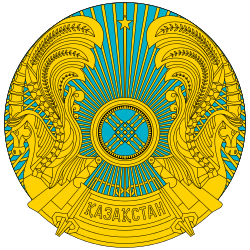Balkhash (city)
| Balkhash Балқаш | |
|---|---|
| City | |
|
Centre of the city | |
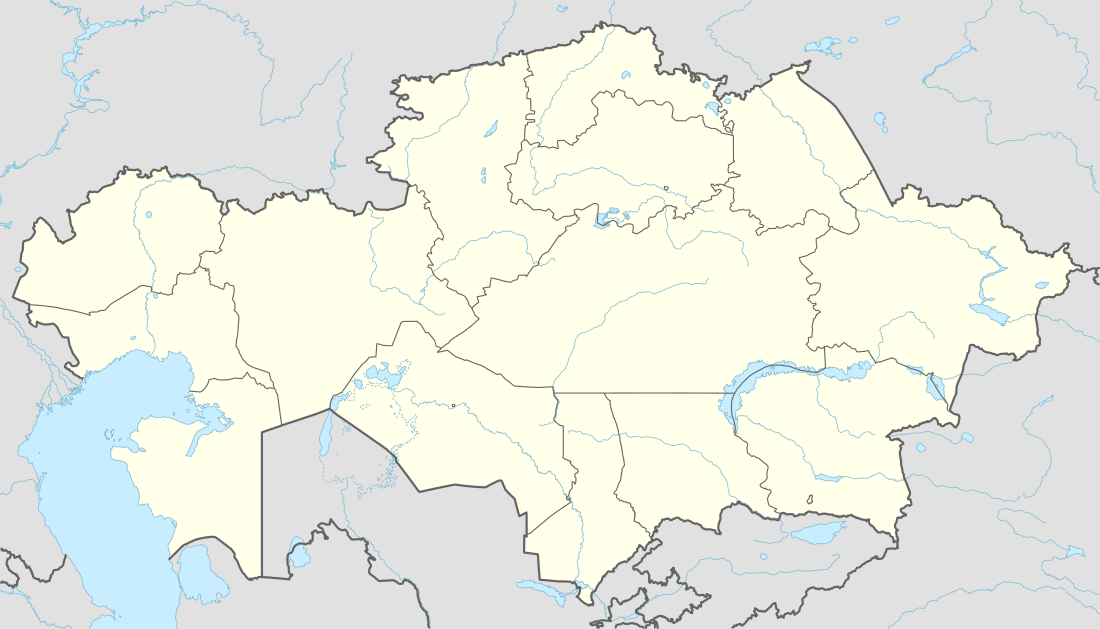 Balkhash Location in Kazakhstan | |
| Coordinates: 46°50′53″N 74°59′42″E / 46.84806°N 74.99500°ECoordinates: 46°50′53″N 74°59′42″E / 46.84806°N 74.99500°E | |
| Country | Kazakhstan |
| Region | Karaganda Region |
| Founded | 1931 |
| Incorporated (city) | 1937 |
| Government | |
| • Akim (mayor) | Nurlan Erikbaevich Aubakirov (since 29 May 2012) |
| Elevation | 440 m (1,440 ft) |
| Population (2009) | |
| • City | 68,833 |
| • Urban | 77,662 |
| Postal code | 100300 - 100316 |
| Area code(s) | +7 71036 |
| Website |
www |
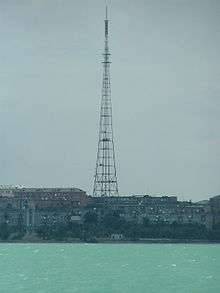
Balkhash (Kazakh: Балқаш, Balqaş; Russian: Балхаш, Balkhash) is a city in Kazakhstan, located on the northern shore of the Lake Balkhash, on the Bay Bertys, and in south of Kazakh Uplands. Population of the city: 68,833 (2009 Census results);[1] 65,431 (1999 Census results).[1]
Balkhash was founded in 1937 as an industrial city centred on the mining and smelting of copper, and presently copper is still exploited there. The city lies approximately 500 km west of the Chinese border on the north side of the lake at an altitude of 440 m.
The history of the city is closely connected with mining of deposits of copper and development of a smelting plant.
History
On 11 April 1937, a small worker`s settlement "Pribalhashstroy", designed in connection with the construction of a copper factory - BGMC, was transformed into the city of Balkhash by decision of the Central Executive Committee of the Kazakh SSR. In this way, the copper factory effected the city's appearance.
On 9 November 1932, the first school was established in the city - school № 1. The school educated a few children of the builders of the city that time. Among these children was Maria Nicolaevna Guseva (Halova). This school became a matter of her life: firstly she was one of the first pupils. Later, she became a teacher. In 1935, a section for parachuting was opened. Its first director was Dyusembayev.
During the Great Patriotic War (Russian term for World War II), most of the male population was conscripted into the military service and women replaced them in the copper factory.
After World War II, Japanese war prisoners took part in the building of the city. In particular, they built buildings, the "Palace of Metallurgists" and the local airport.
After the collapse of the Soviet Union, between 1992 and 1996, the city and its residents, like most former Soviet citizens, experienced an acute crisis, including power outages, weak central heating and intermittent operation of the copper factory. Some people cooked on fires in their yards; in winter they heated their apartments with potbelly stoves. Summer cottages served as an additional source of foodstuffs, contributing to the populace's survival. In the late 1990s, the city's and country's economies stabilised. A new neighborhood was built in the city, the so-called "Canadian cottages". All schools, medical facilities and the college started to function normally.
Administration and directorates
Due to the appointment of former Mayor Kadyrzhan Teylyanova as Chairman of the Committee of Fisheries of the Ministry of Agriculture of the Republic of Kazakhstan, Nurlan Erikbaevich Aubakirov (born 29.12.1975) has been the mayor of Balkash since 29 May 2012.[2]
Balkhash's city government also administers the urban-type settlements of Sayak (3669 people), Gulshat and Chubar-Tubek (625 people). In May 1997, the city of Balkhash was transferred from Dzhezkazgan Region to Karaganda Region due to a boundary change.
Population
The combined population of the city and its urban area is 75,453 people (2010). The ethnic composition on 1 January 2010 was:[3]
- Kazakhs — 50,307 people (64,94 %)
- Russians — 19,823 people (26,20 %)
- Ukrainians — 1,169 people (1,94 %)
- Germans — 1,032 people (1,83 %)
- Koreans — 1,172 people (1,55 %)
- Tatars — 1,080 people (1,43 %)
- Belarusians — 229 people (0,37 %)
- Chechen people — 183 (0,24 %)
- Azerbaijani people — 119 (0,16 %)
- Uzbeks — 112 people (0,15 %)
- Others — 1,134 people (1,50 %)
- In total — 77,662 people (100,00 %)
In recent years, the number of Russian speakers is dramatically declining, but this is more than compensated by an influx of Kazakhs, who come mostly from rural areas, resulting in growth of the city's population after the substantial decline in the 1990s.
Climate
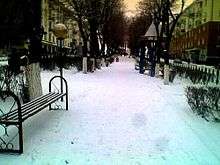
Balkhash has a semi-arid climate (Köppen climate classification BSk) with warm summers and very cold winters. Precipitation is low throughout the year. Snow is common, though light, in winter. The lowest temperature on record is −41.2 °C (−42.2 °F), recorded in December 1938, and the highest temperature is 40.9 °C (105.6 °F), recorded in July 2005.[4]
| Climate data for Balkhash | |||||||||||||
|---|---|---|---|---|---|---|---|---|---|---|---|---|---|
| Month | Jan | Feb | Mar | Apr | May | Jun | Jul | Aug | Sep | Oct | Nov | Dec | Year |
| Record high °C (°F) | 3.9 (39) |
6.1 (43) |
24.5 (76.1) |
32.5 (90.5) |
34.4 (93.9) |
37.6 (99.7) |
40.9 (105.6) |
39.5 (103.1) |
37.6 (99.7) |
27.2 (81) |
17.4 (63.3) |
7.5 (45.5) |
40.9 (105.6) |
| Average high °C (°F) | −8.7 (16.3) |
−6.7 (19.9) |
1.7 (35.1) |
14.3 (57.7) |
22.1 (71.8) |
27.9 (82.2) |
29.6 (85.3) |
28.1 (82.6) |
21.7 (71.1) |
12.9 (55.2) |
3.0 (37.4) |
−5.2 (22.6) |
11.7 (53.1) |
| Daily mean °C (°F) | −13.3 (8.1) |
−12.1 (10.2) |
−3.6 (25.5) |
8.3 (46.9) |
16.4 (61.5) |
22.3 (72.1) |
24.2 (75.6) |
22.4 (72.3) |
15.6 (60.1) |
7.1 (44.8) |
−1.8 (28.8) |
−9.7 (14.5) |
6.3 (43.3) |
| Average low °C (°F) | −17.6 (0.3) |
−16.8 (1.8) |
−8.2 (17.2) |
3.1 (37.6) |
10.7 (51.3) |
16.3 (61.3) |
18.5 (65.3) |
16.3 (61.3) |
9.3 (48.7) |
2.0 (35.6) |
−5.7 (21.7) |
−13.7 (7.3) |
1.2 (34.2) |
| Record low °C (°F) | −40.1 (−40.2) |
−40.2 (−40.4) |
−30.8 (−23.4) |
−14.2 (6.4) |
−5.5 (22.1) |
4.0 (39.2) |
6.9 (44.4) |
3.7 (38.7) |
−4.7 (23.5) |
−14.8 (5.4) |
−32.7 (−26.9) |
−41.2 (−42.2) |
−41.2 (−42.2) |
| Average precipitation mm (inches) | 13 (0.51) |
11 (0.43) |
12 (0.47) |
10 (0.39) |
15 (0.59) |
12 (0.47) |
14 (0.55) |
9 (0.35) |
4 (0.16) |
9 (0.35) |
16 (0.63) |
13 (0.51) |
138 (5.43) |
| Average rainy days | 2 | 2 | 5 | 7 | 9 | 8 | 9 | 6 | 4 | 7 | 7 | 4 | 70 |
| Average snowy days | 15 | 14 | 7 | 1 | 0.1 | 0 | 0 | 0 | 0 | 1 | 8 | 15 | 61 |
| Average relative humidity (%) | 79 | 78 | 74 | 56 | 51 | 46 | 49 | 47 | 47 | 60 | 75 | 79 | 62 |
| Mean monthly sunshine hours | 153 | 179 | 228 | 276 | 335 | 367 | 377 | 363 | 299 | 222 | 151 | 131 | 3,081 |
| Source #1: pogoda.ru.net[4] | |||||||||||||
| Source #2: NOAA (sun only, 1961–1990)[5] | |||||||||||||
Photo gallery
-
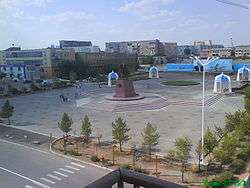
Centre of town.
-
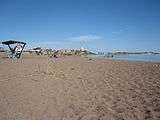
Part of the town beach.
-

Metallurgical works.
-
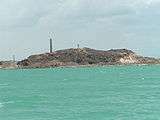
Old metallurgical works.
-

Monument to victims of reprisals.
-
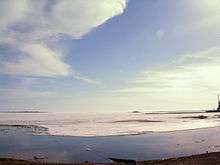
Spring. Beach. 22 March 2008.
-
Lake in the spring time. 22 March 2008.
See also
References
| Wikimedia Commons has media related to Balqash city. |
- 1 2 "Население Республики Казахстан" (in Russian). Департамент социальной и демографической статистики. Retrieved 8 December 2013.
- ↑ BNEWS KZ (in russ.)
- ↑ Национальный состав населения Казахстана по переписи 2009
- 1 2 "pogoda.ru.net Погода и Климат". Retrieved October 20, 2016.
- ↑ "Balhash Climate Normals 1961-1990". National Oceanic and Atmospheric Administration. Retrieved January 10, 2012.
External links
| Wikivoyage has a travel guide for Balkhash. |

